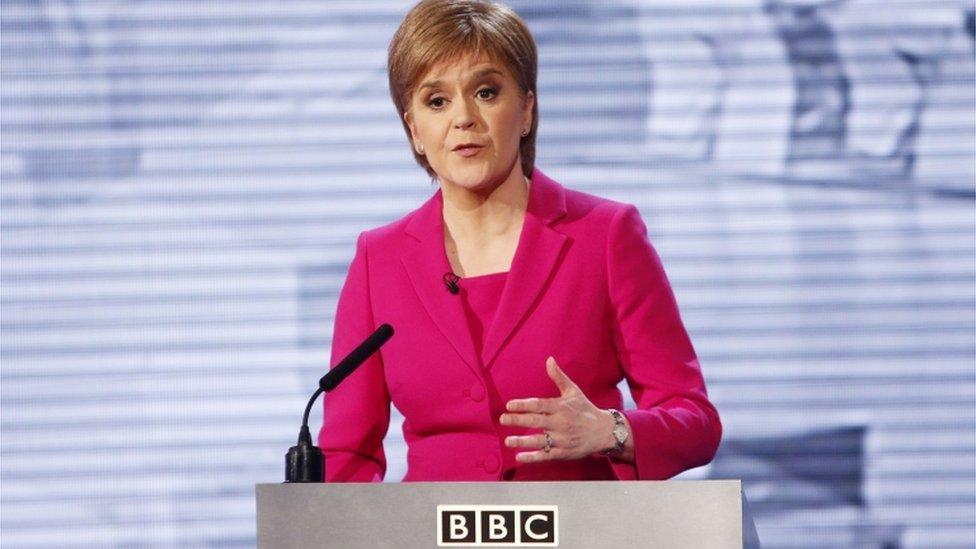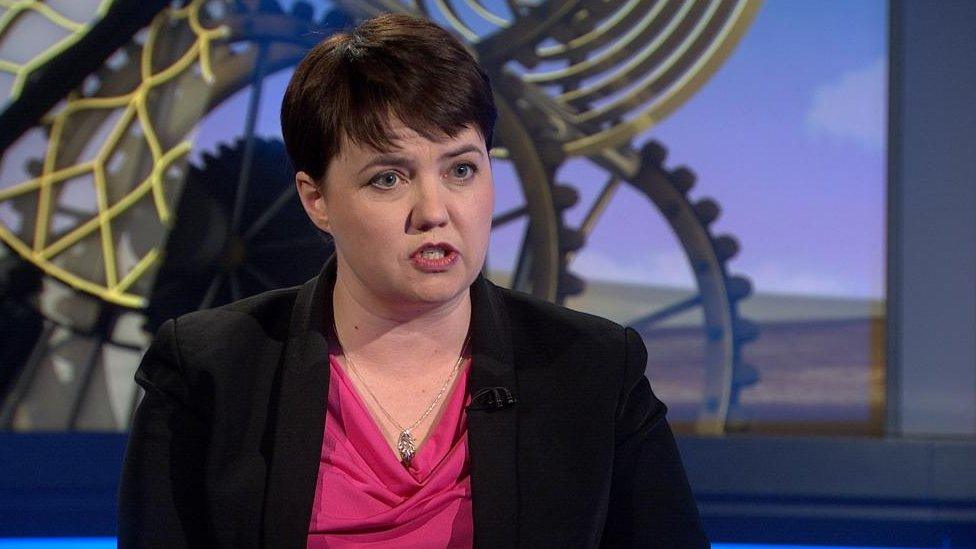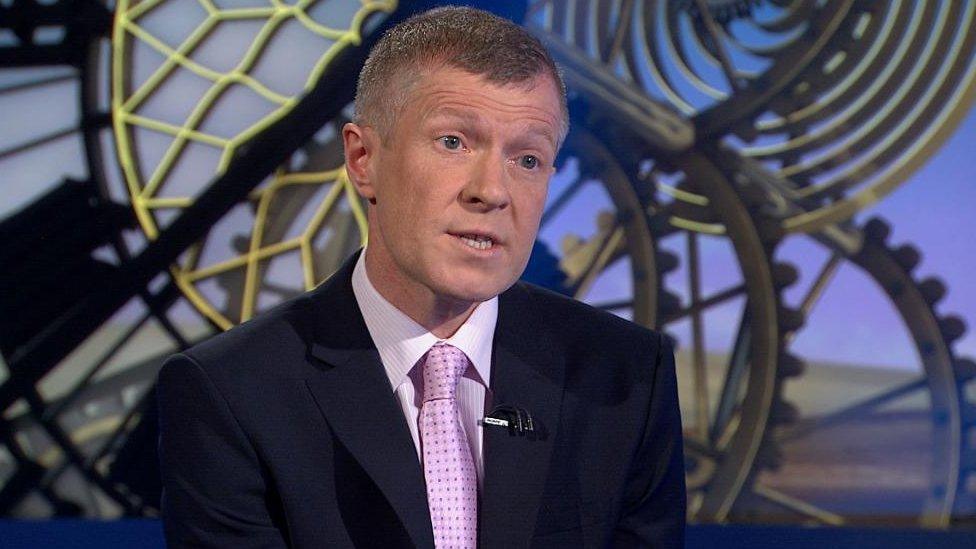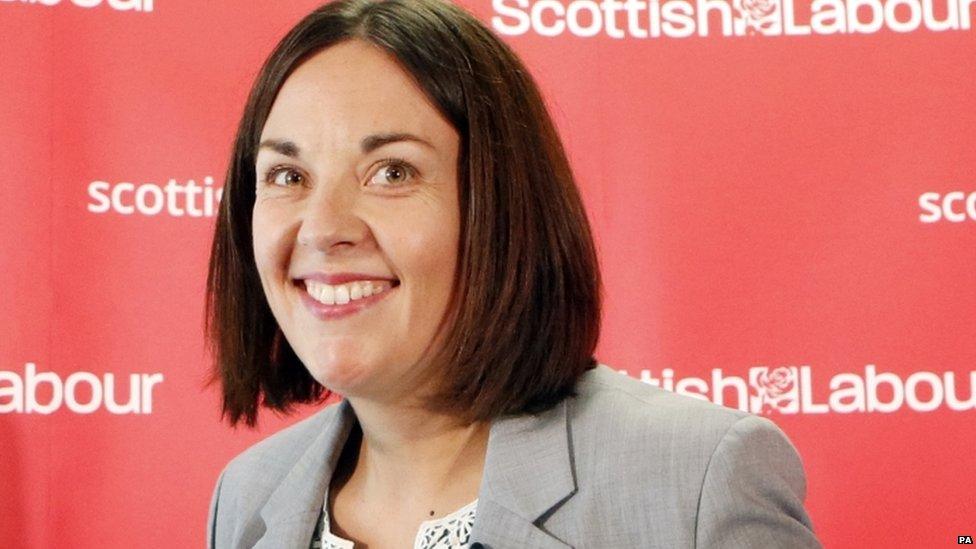Holyrood 2016: Parties focus on climate change and education
- Published

Nicola Sturgeon will raise Scotland's climate change target if the SNP are re-elected
Climate change and education have been on the agenda as campaigning for the Holyrood election continues.
SNP leader Nicola Sturgeon pledged to raise Scotland's 2020 climate target from the current 42% cut in greenhouse gas emissions to more than 50%.
The new target would be contained in a Climate Change Bill if the party is returned to government at the 5 May election.
The current legislation requires a minimum 42% cut in emissions by 2020.
The Scottish government has missed its interim emissions targets for the last four years.
'Global challenge'
The SNP's Aileen McLeod said: "It has not always been easy but Scotland has been a genuine world leader in the area of climate change and green energy, and the latest evidence shows that we are on track to exceed our 42% target."
She added: "We hope other parties will back this move and work constructively to ensure Scotland continues to lead on this great global challenge. And we hope other countries will note Scotland's increased ambition in this area and raise their own efforts to reduce their emissions."
The party's manifesto will be unveiled on Wednesday at an event billed as Scotland's largest manifesto launch.
'Opposition leader'

Ruth Davidson is confident she will be leading the opposition at Holyrood after the election
Ruth Davidson and Willie Rennie were interviewed on the BBC Sunday Politics Scotland programme, with both expressing optimism about their chances in the election.
Ms Davidson, the Scottish Conservative leader, said she would be the opposition leader after 5 May.
Scottish Lib Dem leader Willie Rennie insisted his party had learned from its mistakes.
Ms Davidson said: "We need a really strong opposition to the Scottish government because there has not been one in the last nine years and I can do that.
"I'm going to hold the SNP to account, I'm going to say no to a second referendum on independence and I'm going to say lets focus on the things that matter to the people in the country. "
The Scottish Conservative leader also defended her plans for a graduate contribution of £6,000 for an honours degree, said her party would offer local authorities the power to impose a moratorium on wind farms and fracking and stressed Brexit would not provide a mandate for a second independence referendum.
On the issue of the so-called Panama Papers revelations, Ms Davidson said David Cameron had put more information in the public domain than any other prime minister, but that, in retrospect it would probably have been better if he had released all the information at once.
'No coalition'

Willie Rennie says the Lib Dems will provided a positive upflifting agenda
Willie Rennie said there is no doubt the Lib Dems were "tarnished" during the coalition years at Westminster, but now there was a "progressive agenda on tax, guaranteeing civil liberties, protecting the environment and making sure we boost mental health services".
Mr Rennie conceded reneging on the tuition fees pledge, made ahead of the 2010 election was a mistake, but stressed "there is no doubt we are never going to make that mistake again".
He insisted people are coming to the Scottish Lib Dems due to its "positive upflifting agenda".
The Scottish Lib Dem leader insisted his party would not go into coalition at Holyrood, stressing his party had "punched well above its weight" in the last parliament.
Mr Rennie outlined plans for spending on education, from the £500m he said could be raised by adding one penny to the rates of income tax and stressed a return to local policing, without breaking up Police Scotland.
'After-school clubs'

Kezia Dugdale plans to give £40m a year for after-school sports clubs
Meanwhile Scottish Labour leader Kezia Dugdale has been campaigning in Edinburgh, focussing on education.
Ms Dugdale said a Labour Scottish government would invest £40m a year in after-school sports clubs.
She says her party will use the Barnett consequential from the recently announced sugar tax to deliver funding worth an average of over £100,000 per secondary school, dependent on school rolls.
This investment would be part of a wider move to make local schools and the associated facilities the hub of community sport activity as part of Labour's plans to use the new powers of the Scottish Parliament to stop the cuts.
Ms Dugdale said: "This can be a revolution for after-school sport in Scotland. After-school clubs and extracurricular activities are where young people find out who they are and what they're good at.
"Cutting education will cut the opportunities our children enjoy. That's why Labour will use the new powers to stop the cuts and why we will invest £40 million a year in after-school sports clubs."